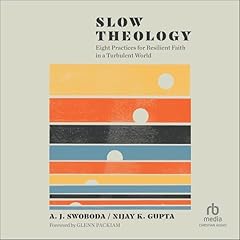
The Gospel After Christendom
An Introduction to Cultural Apologetics
No se pudo agregar al carrito
Add to Cart failed.
Error al Agregar a Lista de Deseos.
Error al eliminar de la lista de deseos.
Error al añadir a tu biblioteca
Error al seguir el podcast
Error al dejar de seguir el podcast
 Exclusivo para miembros Prime: ¿Nuevo en Audible? Obtén 2 audiolibros gratis con tu prueba.
Exclusivo para miembros Prime: ¿Nuevo en Audible? Obtén 2 audiolibros gratis con tu prueba.Compra ahora por $20.69
-
Narrado por:
-
Mike Lenz
Even after Christendom, our culture is fertile ground for gospel renewal. We need apologetics for the whole church tailored to this moment.
Since the fall of Christendom, Christians in Western countries can no longer assume their neighbors share basic familiarity with the Bible or even a sense for God. We now face a strange mixture of apathy and antagonism toward the gospel. Some people view Christianity as yesterday's news. For others, it's the source of today's problems. Lately, though, more and more are open to the idea that Christianity may be tomorrow's hope.
Amid these confusing and conflicting shifts, we need apologetics for the whole church and not just for those who enjoy arguing. Cultural apologetics can help uncover opportunities to proclaim the gospel as the only way to fulfill longings for truth, beauty, and goodness. Churches that embrace this approach can be strengthened and renewed as they demonstrate an appealing and convicting way of life that stands out in the world.
In The Gospel after Christendom, scholars and practitioners from the Keller Center for Cultural Apologetics define cultural apologetics, explain its biblical and historical grounding, and demonstrate its importance for the church today. Their diverse viewpoints, united in the gospel, offer a balanced approach that can guide Christians to share the Good News with their neighbors in this challenging but exciting time.
With contributions from:
- Sam Chan
- Joshua D. Chatraw
- James P. Eglinton
- Skyler R. Flowers
- Rachel Gilson
- Collin Hansen
- Rebecca McLaughlin
- Ivan Mesa
- Alan Noble
- Gavin Ortlund
- Derek Rishmawy
- Daniel Strange
- Bob Thune
- Christopher Watkin
- Trevin Wax
Los oyentes también disfrutaron:




















Las personas que vieron esto también vieron:


















Despite being published in 2025, the book fails to engage with the actual complexities of Christian culture in 2025. It speaks in vague generalities about “culture” and “apologetics,” offering nothing particularly new, insightful, or compelling. Much of what’s said here echoes the work of earlier thinkers like G.K. Chesterton or Francis Schaeffer—but less clearly, less memorably, and with less impact. One wonders why a reader wouldn’t simply go straight to those original sources instead.
There isn’t much to disagree with in the book—it is a repeat of the basic concepts of apologetics. It reads less like the fruit of lived experience and more like abstract theorizing. Unlike Schaeffer, who drew from years of deep conversations and cultural engagement, the authors here sound more like they’re telling you what should be done without showing that they’ve done it themselves.
That said, there are a few bright spots. Contributions from Rebecca McLaughlin and Rachel Gilson offer fresh perspectives that seem better attuned to a broader, more diverse audience. The concluding chapter is also a high point, hinting at the kind of relevance the rest of the book lacks.
Ultimately, I found the book to be a missed opportunity. Cultural apologetics is more important than ever, especially in a fragmented Christian landscape where “Christian culture” often means little more than T-shirts and slogans. Unfortunately, this book doesn’t help the reader navigate those tensions or speak effectively across cultural divides. It’s not that the content is wrong—it just says very little, and takes too long to say it.
A Missed Opportunity in Cultural Apologetics
Se ha producido un error. Vuelve a intentarlo dentro de unos minutos.


